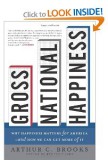Gross National Happiness: Why Happiness Matters for America--and How We Can Get More of It

|
Title | Gross National Happiness: Why Happiness Matters for America–and How We Can Get More of It |
| Author | Arthur C. Brooks | |
| Reviewer | Laurie Morrow | |
| Review Date | October 25, 2011 | |
| Publisher | Perseus/Basic Books | |
| Year | 2008 | |
| Rate this Book |
“If you’re happy and you know it, clap your hands!” goes the children’s song. According to Arthur C. Brooks, in his carefully researched Gross National Happiness: Why Happiness Matters for America—and How We Can Get More of It, those who are clapping are significantly more likely to be married rather than single, religious rather than secular, and conservative rather than liberal.
The Concept of Happiness
Happiness is a nebulous concept—so much so that at least one professor of clinical psychology considers happiness as a form of mental illness. In “A Proposal to Classify Happiness as a Psychiatric Disorder” in the Journal of Medical Ethics, Richard Bentall argues that “Happiness meets all reasonable criteria for a psychiatric disorder. It is statistically abnormal, consists of a discrete cluster of symptoms . . . and it is associated with various cognitive abnormalities, in particular, a lack of contact with reality.”¹ The Onion made a similar point satirically, with a TV news report about “Despondex,” a prescription “depressant” drug to be administered to the insufferably cheerful.
While most would reject Bentall’s assertion that the happy are mentally ill and need a dose of Despondex, clearly, happiness is subjective and difficult to describe. In Gross National Happiness: Why Happiness Matters for America—and How We Can Get More of It, Brooks defines happiness as it is experienced in America, and measures what makes us happy, who is happy, and how happy they are. Brooks considers the study of happiness a moral obligation that has consequences for the nation, for happy people “are more charitable than unhappy people, have better marriages, are better parents, act with greater integrity, and are better citizens” (16-17). Brooks investigates the relationship between happiness and political orientation, religion, marriage, parenthood, and charitable giving. Striving for objectivity, he uses data based on a wide array of methodologies and measures, including self-reporting checked against the perceptions of the subject’s acquaintances; measuring the involuntary electrical responses of the brain to positive and negative stimuli; and the presence or absence of the “Duchesne smile,” an involuntary upper-cheek muscle movement that is a culturally transcendent indicator of genuine pleasure across human cultures. Rather than cherry-pick his data to support any presuppositions, the bowl of cherries Brooks offers us comes pits and all.
Happiness and Political Orientation
Brooks is charmingly candid about his own preconceptions about happiness and his surprise at some of the conclusions to which the data drove him. Reared in a liberal community, he assumed liberals would test happier than conservatives, as they were not subject to the constraints that characterize conservatism. To his surprise, the data demonstrated that conservatives consistently felt more free and happy than liberals, were far less likely to view themselves as worthless or as failures, had more stable marriages, and were more optimistic about the future. Conservatives are, in a word, happier than liberals.
Brooks suggests a number of explanations for this outcome. While conservatives and liberals consider freedom important to happiness, each defines freedom differently. Conservatives conceive of liberty as freedom from government restraint, particularly restraint related to faith and free speech. For liberals, genuine freedom is possible only when the government guarantees citizens food, shelter, education, and health care (87).
Conservatives and liberals, Brooks argues, have fundamental and irreconcilable differences in their assumptions about the individual’s power to transform himself and his society. Conservatives have greater confidence in the individual’s resilience and in his creative capacity to overcome life’s obstacles. Liberals, however, see collective action as the only solution to serious social problems. Irrespective of whether liberals are correct strategically, in making people feel powerless and dependent, modern liberalism seems to make people less happy. Conservatism, however, asserts that each individual can exert at least some control over his life, and that a person can, through his own talent and tenacity, change himself and his world for the better.
Liberals want government to shield people from harm, and are willing to limit freedom to achieve this end. People may, and often do, make foolish, self-destructive choices. Yet, the more free people are to make those wise or foolish choices, the happier they are. Simply being able to make a choice affords us a sense of control over our lives, an essential component of happiness. Brooks illustrates this with an experiment conducted in a nursing home. On one floor, patients were allowed to select the plants in their living space, so long as they also accepted the responsibility to tend them; they were also allowed to choose which would be “movie night.” Patients on another floor, who were equally happy and healthy at the outset of the experiment, were provided with plants and movies, with no responsibility demanded of them and no choice permitted. These seemingly minor differences had major consequences: the first group became more alert, active, and happy, and after eighteen months, died at half the rate than did those “freed” from choice and responsibility (89).
Happiness and Religion
If a sense of control and freedom are necessary to happiness, it might seem that absolute freedom would maximize happiness. Yet, it does not; unrestricted freedom is overwhelming, as it leaves one with no way to filter good from bad choices. Religion enhances happiness in part because it offers such a filter. Brooks' study demonstrates that religious people are happier than secular people, and argues that public policy should encourage the practice of religion, for it benefits not only believers but the citizenry in general. Religious people donate four times more money to charity than secular people. They give more to charity (including nonreligious charities), and are far more likely to give blood or donate food. Households headed by conservatives, who tend to be more religious than liberals, give 30% more than households run by liberals, even when the conservative household had lower income.
Happiness and the Traditional Family
During the 1960s, it became fashionable to see marriage as a source of misery. Brooks reports that in 2004, however, 42% of married Americans said they were very happy, compared to 23% of never-married Americans, with married women slightly more likely (44%) to say they were very happy than married men (41%). Brooks reports that married people tend to be better off, more religious, and more conservative than unmarried people—characteristics he elsewhere shows increase happiness—and that when groups with similar circumstances are compared, married people are 18 % more likely to be very happy.
Happiness and Parenthood
Brooks' study led him to another conclusion that surprised him: that having children made people less, not more, happy. Women, according to Brooks, “enjoy almost everything more than child care” (67).
Curiously, Brooks' results seem to mirror those gotten by advice columnist Ann Landers four decades ago, when she asked her readers, “If you had it to do over again—would you have children?” Landers received over 10,000 responses, with 70% answering “No.” Landers’s results don’t validate Brooks' observations, of course; she was the first to admit that her survey was an unscientific and inherently biased one, as unhappy parents were more likely to respond than happy parents.
Though Brooks' investigation is far more statistically sound, his conclusion may be less definitive than he believes it to be, as his study may also have been unintentionally biased toward producing a negative result. The flaw lies in the definition of “child care” used in the studies upon which Brooks relies. Brooks' otherwise meticulous methodology doesn’t define what either he or these studies includes in the activities involved in “child care,” a term that covers an awful lot of territory. As a mother myself, I freely concede that tending to a child’s needs involves considerable scut work, as anyone who’s wielded a baby nasal aspirator can attest. If “child care” consisted mainly of such stress-inducing janitorial activities, most women would prefer any other activity Brooks lists, and he could throw in fire-eating and chainsaw juggling without significantly skewing the results.
But caring for a child also includes much that parents consider highly pleasurable—nuzzling the baby’s hair after his bath, escorting your three-year-old daughter turned fairy princess from house to house on Halloween, watching your boy’s shy smile as he blows out the flickering birthday candles, drying the tears of a child with a skinned knee and comforting her till she laughs again.
The problem is, I think, that the term “child care” connotes the work-for-hire offered at a day-care center—something rather different from what the term “motherhood” suggests. One wonders whether the same results would have been produced, had that term, fallen sadly in disuse, been substituted for “child care.”
Given Brooks' conclusion that child-rearing makes people less happy, one would expect he would advise those wishing to maximize their chances for happiness to avoid having children. Yet, Brooks (himself the father of three) does not do so. Deviating from his operational definition of happiness—a state in which the pluses of life generally outweigh the minuses—he argues that children confer meaning on life, producing thereby a higher kind of happiness, “the ‘moral quality of life,’ which Aristotle called eudaemonia”. Giving one’s child unconditional love “is itself a source of happiness,” Brooks asserts (69). “We should think of parenthood as a charitable act” (72).
Money and Happiness
Rich people, unsurprisingly, are typically happier than poor people, which is consistent with Brooks' finding regarding the importance of choice and control to one’s happiness. Some believe human happiness would be enhanced, were greater economic equality produced through government-mandated wealth redistribution. Brooks believes that happiness comes from achievement, which a paycheck confirms. Even poor Americans are generally optimistic, for they believe they can improve their life through hard work. Brooks argues that government policies aiming to help the poor should focus not on achieving income equality but on increasing economic mobility for the poor by improving education, making labor markets more fluid, and encouraging investment and entrepreneurship.
One of Brooks' findings that surprised me is that most Americans like or love their jobs, irrespective of the work they do or the income they earn (157). People like to work; indeed, the happier people are, the more hours they put in at their jobs. Americans find emotional security not only in having jobs themselves, but in knowing jobs are available for others, which is why, in a down economic climate, even securely employed people feel less happy.
Regular employment helps make us happy in another way, for it enables us, as Brooks puts it, to “buy” happiness through charity. People who donate to charity are 43% happier than those who do not (177). Donors suffer less depression, lower stress hormone levels, and increased endorphin levels. Thus, physically as well as spiritually, charitable giving makes you feel good.
The Importance of Being Happy
Brooks draws conclusions that those in search of enhancing their own or others’ happiness may want to consider: that while income is important, so is a genial family life; that employment enhances one’s sense of accomplishment and content; that a positive attitude, a sense of humor, and religious faith help one transcend misfortune and achieve a sense of equanimity; that being charitable helps both donor and recipient. These may be simple truths, but they are not trivial ones.
Laurie Morrow, Ph.D., a former college professor and talk radio show host, is the President of Morrow Public Relations in Montpelier, Vermont, and a contributing editor to Conversations on Philanthropy. (REV. 2009)
¹Bentall, Richard P. 1992. “A Proposal to Classify Happiness as a Psychiatric Disorder.”Journal of Medical Ethics, 18: 94-98.




